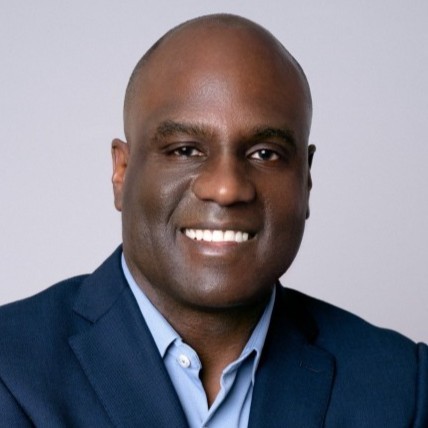How the City of San Francisco Competes with Silicon Valley for Tech Workers
You're honest, hardworking, and stable. You don't have much money, but you can offer someone a comfortable and happy life if they decide to take a chance on you. The problem is, you're competing for the object of your affection with someone who's way more popular, and has a lot more money in the bank.
This may sound like the plot of a romantic comedy. But it's really a normal day at the office for Alby Bocanegra. He's the recruiting manager for the City and County of San Francisco's Department of Technology. And, his job is to convince tech professionals to choose a life in city government, over a few little companies called Google, Yahoo, Uber, Apple, Facebook and all the other well-known, well-paying tech companies in the Bay Area.
The presence of such flashy competition doesn't exactly make Bocanegra's department the belle of the tech recruiting ball.
"I'm in technology mecca and it's hard to compete [with tech companies] because people can make more money, [get] free coffee, bring your dog to work, nap rooms," Bocanegra says in a LinkedIn webinar titled "Raising the Bar: Recruiting Success Stories with City and County of San Francisco."
Of course, as a taxpayer-supported agency, Alby can't offer candidates the money they'd make at the big tech firms. He's also constrained by a city bureaucracy that can slow hiring to a crawl, a small recruiting staff, and an even smaller recruiting budget.
So how does he convince a tech candidate to take a modest-paying city job when riches and glamour literally await down the road — or, more accurately, down Highway 101? Alby shares his problems, and how he manages to compete with the big boys for the brightest minds in tech.
1. Appeal to their sense of civic pride
Alby knows he'll likely lose a straight salary fight with household-name tech firms. So he finds something other than money with which to appeal to candidates.
"A lot of folks want to do meaningful work and they want things that are mission-driven," he says. "It's not always about generating revenue or profit."
Alby tells candidates that a job with the city can offer that meaning. "What we have to offer is mission and purpose; that's our competitive advantage," he says. "I'm a [U.S. Army] veteran. I almost equate this to doing a service for your city or your state and serving. That's why it's called civil service; you are a civil servant."
He finds that for some candidates, the prospect of serving their city can be just as enticing as money.
"I just say, 'Look, you could just come and do a tour of duty,'" he says. "'It can be your civic duty to do something great for your state, or your city.' So I think from the very beginning, just communicating that and getting people really kind of jazzed up about the work they're going to do and what a great portfolio builder it is — presenting that as part of the value proposition is good."
2. Promise an easier lifestyle than what they’ll have in hard-driving, ultra-competitive Silicon Valley
We've all heard the horror stories of overworked techies who don't have time to sleep, eat, or even see the sunlight. That provides another advantage Alby doesn't hesitate to exploit when talking to candidates: the promise of a better work/life balance.
"There's a little bit more balance [than private sector companies]," he says. "You have that opportunity to step away a little bit, and take your vacation and reset when you have to."
3. Create an employer brand to communicate what the city does
According to Alby, many people simple don’t know what city departments actually do. Contrast that to the well-branded private sector tech giants. "You can mention any [big tech] company and you know what their brand is," he says.
So that makes it even more important for public agencies like his to put out a strong employer brand to attract candidates. Alby's department, for instance, has a robust LinkedIn Company page. "We've put on our pages the services we provide, some rich content, some videos — things that really communicate what we're responsible for," he says. "But also to communicate what are the types of folks or profiles that we're looking for to join our team. So the message is two-fold: it's what do we do and what are we looking for."
Alby finds his employer branding efforts make it easier to recruit tech candidates who otherwise wouldn't have considered working for the city. "The more transparency and the more communication, the more possibilities we have," he says. "People that are civic-minded but just don't know it yet might read that message one day and say 'Wow! You're responsible for this? That's great! I'd love to do that. It matches my skill sets. How about I come work for you now?'"
4. Put in face time with local talent
Because many tech workers may not be considering or even know about possible careers in city government, Alby finds he needs to do a lot of in-person, face-to-face outreach.
"I like going to talent networking events," he says. "I spend a lot of time on Meetup and different organizations, to find out where the talent is meeting." He also networks via professional tech organizations and tech boot camps, as well as local workforce organizations. The goal is to physically meet as many people as humanly possible so they can find out who you are, what you do, and why the city of San Francisco is a viable career option for tech professionals.
"I would say most of my time is spent trying to have engaging, meaningful one-on-one conversations with talent," he says. "Spending a lot of time doing that, even 5-10 hours a month, at least one candidate will come out of that."
5. Stay in sync with hiring managers to speed up the hiring process
In city government, you simply can't get around the deliberate pace of bureaucracy, which tends to slow down the hiring process. "Private sectors can hire with agility," Alby says. "Government is challenged in that area because there's additional clearances and processes that come into factor."
He says the time delay that often comes with posting and hiring for new positions sometimes causes him to lose out on talent. "To keep them on the hook and keep them interested while you're going through some of these processes, which can be cumbersome and time-consuming — that's a challenge," he says.
So it's especially important that he and the hiring managers are synced-up and ready to pounce once the bureaucracy gives them the green light to hire someone.
"If I see there's a vacancy, I initiate a conversation with [the hiring manager] to discuss what's the profile he or she is looking for, what are the specific skill sets, what are the additional certifications, or the additional things that are going to make someone successful in this role," he says. "So from the very first conversation with the hiring manager, we're taking about what it's going to take for someone to be successful in this position. And I build my sourcing and recruiting strategy around those needs."
6. Make candidates feel valued
"It's tough," Alby admits about trying to lure tech candidates away from the bigger and richer suitors. "I won't sugarcoat that." But he says communicating with candidates, and making them feel valued and important in the hiring process can make a big difference.
"Sometimes they don't get that," Alby says. "They can get all these offers to work at these great places but when they feel like they're valued and they're being taken through the process and the people they're talking to — whether it's the recruiter [or] hiring manager — really do want them there and they're going to be appreciated, it goes a long way."
So if you, like Alby, find yourself squaring off against bigger and sexier rivals for talent, remember: just like in the movies, with the right amount of attention, hard work, and a little passion, the underdog can beat the big guys in the end.
*Image by Sudheer G
To receive blog posts like this one straight in your inbox, subscribe to the blog newsletter.
Topics: Recruiting strategy
Related articles




